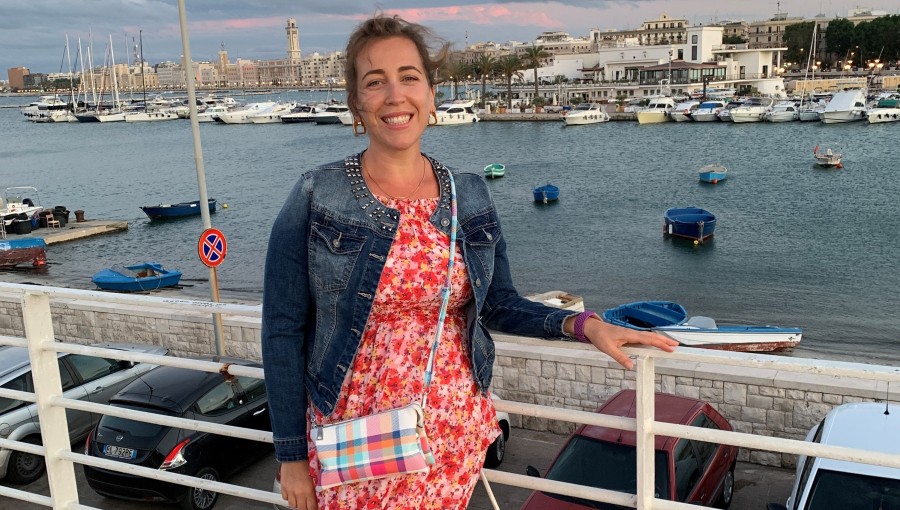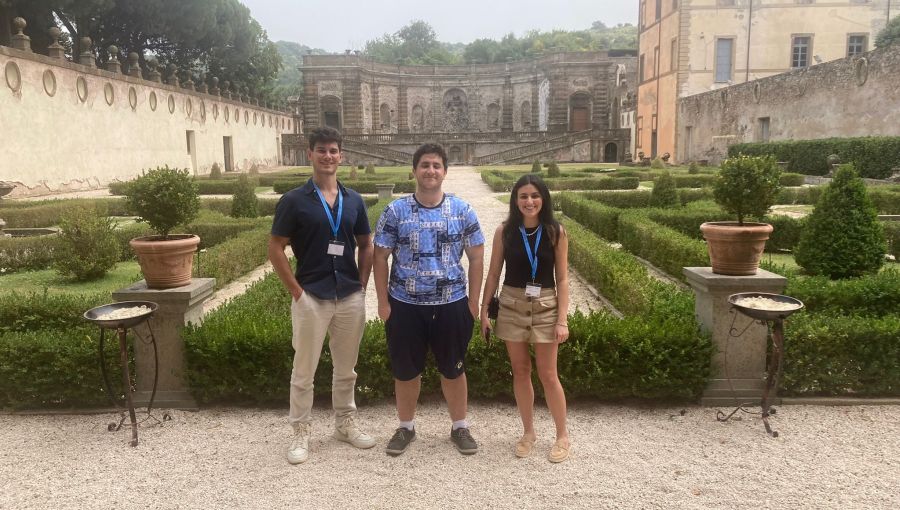Alumna Annamaria Borelli to Perform in Puccini's La Bohème in Rome's Teatro Vittoria
Alumna Annamaria Borelli was born and raised in New Jersey. She earned a B.A. in Italian Studies in 2013 and is currently working as an English teacher in Rome. Passionate about opera and musical theater, Annamaria will be performing the role of Musetta in Giacomo Puccini’s opera La Bohème with the company Vox Unica in Rome’s Teatro Vittoria in January 2022.

Annamaria Borelli
Tell us about your background.
I’m Italian-American. My maternal grandparents were from Corato, Bari, in the Puglia region. What brought me to JCU was my intense love for Italian culture. I always wanted to live and study in Italy, and JCU was the perfect opportunity to turn this dream into a reality.
Congratulations on your upcoming performance in the opera La Bohème with the company Vox Unica. Tell us more about it.
Thank you so much! It really has been a dream come true. Before Covid hit, I really wanted to expand my horizons when it came to performance. Through my various music contacts in Rome, I got in touch with soprano Amelia Felle and auditioned for her. She agreed to take me on as a student, and we have been working together for a total of two years. During the pandemic, we studied the role of Musetta in La Bohème. The day I received the call that I would be performing at the Teatro Vittoria in Testaccio with Vox Unica, I was overjoyed. It was a huge milestone for me. I had always wanted to find a way to incorporate my degree in Italian Studies with my love for opera singing. This is the opportunity to do just that. The director, Giancarlo Nicoletti has put a modern, young spin on the tragic tale of four struggling bohemians. Amelia Felle, the musical director, has worked tirelessly to assist us in being as precise and expressive as possible in our delivery. It is truly an honor and a privilege to have the opportunity to bring Giacomo Puccini’s masterpiece to life.
How did your Italian Studies major help you with your singing career?
Italian Studies was the fundamental step. I grew up surrounded by Italian culture and language since I was raised with my maternal grandparents who spoke the dialect of the town of Corato and my mother, Angela Mangione-Borelli taught Italian in the New Jersey public school system for forty years. My father was a drama teacher at the same school, and my sister and I were raised appreciating not only the arts but also Italian language and culture. My sister now teaches Italian in the New Jersey public school system, so the tradition continues. I had a strong foundation thanks to my mother who taught me so much. JCU’s expert professors really helped me build on that foundation and increased my listening, pronunciation, speaking, and reading skills in Italian. At JCU I was able to immerse myself in the language I was studying, which was a huge asset compared to studying the language at home in the USA. Plus, the art history classes were especially amazing because I was able to see the art we were discussing in person.
In order to perform an opera in Italian, you must have great diction and JCU gave me that base. Having studied Italian literature at JCU, I was able to understand the poetic language used in the libretto of La Bohème written by Luigi Illica and Giuseppe Giacosa. Without this foundation, I would not have been able to learn and pronounce the Italian words in the text.
What classes and/or professors had the biggest impact on you?
Professor Federica Capoferri was my advisor and one of my favorite Italian professors at JCU. She was so passionate about Pier Paolo Pasolini, and I really enjoyed reading the novel Ragazzi di vita. While studying with Professor Capoferri I looked up Maria Callas in Medea (1969) directed by Pasolini, not only because I love Maria Callas, but because I wanted to further explore the genius that was this director, author, poet, and intellectual. Professor Capoferri’s love and passion for Italian cinema and literature were so contagious that to this day I always try to read as much as I can in Italian. The courses that most inspired me were Italian Cinema, The Image of Rome in Italian Literature and Cinema, Survey of Italian Literature I and II, and Introduction to the Study of Italian Literature. Grazie, professoressa!
Why should anyone major in Italian Studies in this day and age?
I think one should study what they really like and feel passionate about. I think that if you study something just to get that piece of paper it will eventually catch up with you, and you will try to do what you like in the end. I think Italian is a language that can open many doors in the fields of fashion, import/export, the wine industry, art, translation, and especially the food industry. Italy has given the world so much and someone who is fluent in Italian can use this to their advantage in these fields. If you also pair Italian with business, communications, and English you can conquer the world! Languages bridge gaps and make cultural divides smaller. If you are bilingual you can take many careers to the next level.
You are also an English teacher. What do you think makes someone a good language teacher?
Ironically, I think learning Italian made me a good English teacher. Learning another language’s grammar allows you to perfect your own language skills. In addition, empathy is a huge quality to have when it comes to teaching. I understand my students’ plight because I was right there with them. There were days that I struggled with Italian. There were grammar concepts I couldn’t understand, exceptions to rules that I couldn’t remember, and words where I didn’t know where to put the accent. Learning a language can be frustrating. I put myself in my students’ shoes, and I try to be as patient and empathetic as possible. I also try to connect with my students and tell them that I understand and appreciate their culture. My grandmother came to the States from Italy when she was a grown woman. She struggled to learn the language, but she made it through sheer willpower and determination. I am also teaching English in Italy in her honor. If I can help one student speak better and be successful, then it was time well spent. I also try to make it more of a cultural exchange, so the student feels at ease. If students are comfortable, serene, and feel understood it really opens them up to take the risk, make a mistake and learn. As they say, sbagliando s’impara!
I would like to conclude by saying that I will never forget my experience at JCU. It helped me grow in so many ways and made me the woman I am today. During those years at JCU I grew professionally, academically, but most of all personally. Studying abroad and choosing JCU in Rome was not only a culturally rich experience, but it made me realize my full potential and believe in myself. Thank you JCU and Italian Studies!
La Bohème will run from January 4 – 16 at Teatro Vittoria in Rome, Italy.





